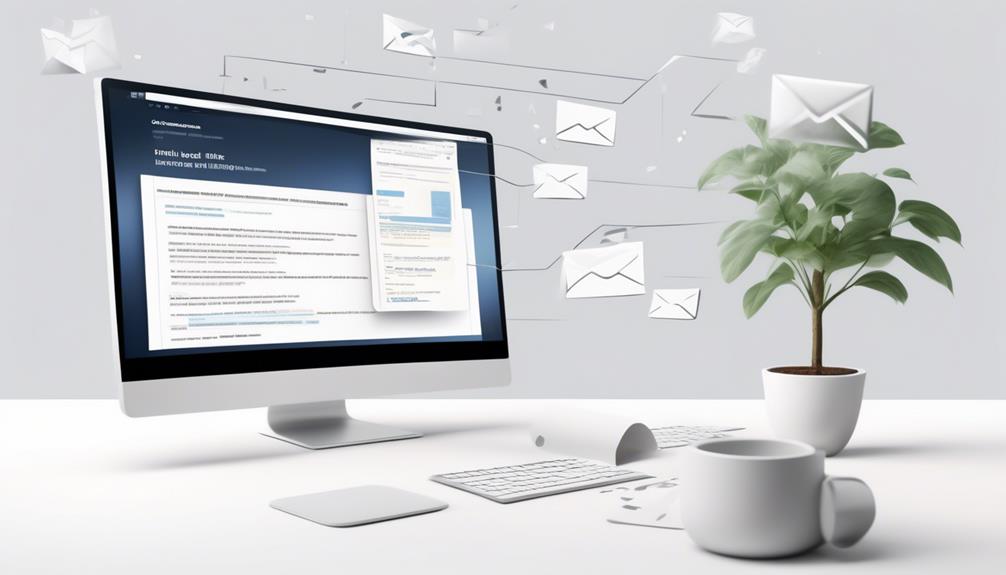In the ever-changing realm of email communication, the discussion around using capital letters in email subject lines lingers like a misty morning fog, shrouded in uncertainty.
The simple act of capitalization may seem inconsequential, but its impact on the recipient’s perception and engagement with your email cannot be overstated.
Is there a definitive answer to this dilemma, or should we consider the nuances and implications before making a decision?
Join us as we dissect the complexities and uncover the best approach to this seemingly simple yet crucial aspect of email etiquette.
Key Takeaways
- The subject line is crucial in email open rates, so it is important to prioritize clarity and professionalism in capitalization.
- Capitalizing email subjects enhances professionalism, consistency, and can positively influence email deliverability.
- Lowercase subject lines can resonate with contemporary communication trends and may appeal to a younger audience.
- Factors to consider for email subject line capitalization include open rates, brand aesthetics, audience preferences, and industry norms.
Understanding Email Subject Lines Capitalization
Understanding the nuances of capitalizing email subject lines can significantly impact the effectiveness of our communication strategy. The subject line is the first thing recipients see, and it plays a crucial role in determining whether an email is opened or ignored.
When considering subject line capitalization, we must prioritize clarity and professionalism. Different capitalization styles, such as sentence case and title case, are commonly used. We must avoid using all caps or random caps, which can trigger spam filters and appear unprofessional.
Personalizing subject lines, using numbers, and creating curiosity are strategies that can increase open rates. Consistency in capitalization and keeping subject lines short and clear are essential best practices.
It’s important to consider the purpose, audience, and industry norms when deciding on the capitalization style for the subject line. By paying attention to subject line formatting, we can potentially boost engagement metrics and enhance the impact of our email marketing efforts.
The Case for Capitalizing Email Subjects

Capitalizing email subjects can significantly impact the effectiveness of our communication strategy, making it crucial to understand the case for proper capitalization.
When we capitalize email subject lines, we enhance professionalism and clarity, which are essential in business communication. Consistency in capitalization throughout our email subjects helps in establishing a coherent and organized brand image, contributing to a more polished and credible appearance.
By capitalizing the first word of our email subjects, we adhere to Title case, which is a widely accepted standard and reflects attention to detail. This can capture attention and convey a sense of importance to the recipient, increasing the likelihood of the email being opened.
Additionally, proper capitalization can positively influence email deliverability, as some spam filters may flag emails with poorly formatted subjects.
Ultimately, taking the time to capitalize email subjects demonstrates our commitment to clear, professional, and effective communication, making it a worthwhile investment in our overall email strategy.
The Case Against Capitalizing Email Subjects
Embracing a more informal and personalized approach, lowercase subject lines can resonate with contemporary communication trends and foster a relatable tone. Consider the following factors when deciding on the capitalization style for email subject lines:
| Factors | Lowercase Subject Lines | Uppercase Subject Lines |
|---|---|---|
| Open Rates | Studies suggest that lowercase subject lines can result in higher open rates. | Some research indicates that unconventional capitalization can make emails stand out and appeal to a younger audience. |
| Brand Aesthetics | Lowercase subject lines may align with a brand’s aesthetics and foster a personalized and conversational tone. | Consistency in capitalization reinforces brand identity, emphasizing important messages strategically. |
| Audience Preferences | It’s important to consider the preferences of the target audience when deciding on capitalization style. | Consider the nature and tone of the email, industry norms, and brand perception. |
Factors to Consider for Email Subject Line Capitalization

Considering the impact of email subject line capitalization on open rates, brand aesthetics, and audience preferences, it’s crucial to carefully weigh the factors influencing this decision. When it comes to making the first impression, the formatting of your email subject line might significantly affect its performance. Here are some best practices to consider:
- Sentence Case: Using sentence case (capitalizing only the first word and proper nouns) can make the subject line appear more natural and approachable.
- Capitalize Every Word: Capitalizing every word in the subject line can add a sense of formality and importance, potentially catching the reader’s attention.
- Open Rates: Analyzing the open rates for different capitalization styles can provide valuable insights into what resonates best with your audience.
- Brand Aesthetics: Aligning the capitalization with your brand’s style guide ensures consistency and reinforces brand identity.
- Audience Preferences: Conducting A/B testing to gauge audience preferences can help determine the most effective capitalization approach for your specific audience.
Careful consideration of these factors will help you optimize your email subject line capitalization for maximum impact.
Best Practices for Email Subject Line Capitalization
When crafting email subject lines, it’s essential to utilize capitalization strategically to enhance engagement and maximize impact. One of the best practices for email subject line capitalization is to follow standard capitalization rules. This means capitalizing the first letter of the first word, proper nouns, and the first letter of each new sentence. Consistent and proper capitalization not only enhances the professionalism of your email communication but also ensures that your email campaigns make a positive first impression.
A/B testing different capitalization formats can also provide valuable insights into what resonates best with your audience. For small businesses, in particular, this can be a game-changer in optimizing open rates and click-through rates.
Additionally, incorporating the recipient’s name in the subject line and using sentence case (capitalizing only the first letter of the first word) can make the email feel more personalized and less likely to trigger spam filters.
Frequently Asked Questions
Are You Supposed to Capitalize Email Subject Lines?
Yes, we capitalize email subject lines for clarity and professionalism. However, we balance this with readability and personalization, favoring sentence case for casualness and easier comprehension. It’s crucial to avoid all caps and random caps to avoid negative perceptions and spam filters.
Should Subject Titles Be Capitalised?
Subject titles should be crafted carefully, ensuring clarity and brevity. Our team advises against random capitalization, all caps, and excessive formality. We prioritize a personal, casual approach for better readability and engagement.
How Should the Subject Line Be in Email Writing?
In email writing, the subject line should be clear, concise, and relevant to the content. It’s crucial for capturing attention and prompting recipients to open the email. A well-crafted subject line can significantly impact communication effectiveness.
Do You Capitalize Your Title in an Email?
We always capitalize our email titles to grab attention and convey professionalism. It’s a small effort with a big impact. Recipients notice and appreciate the care we put into crafting our email subjects.
Conclusion
In conclusion, when it comes to capitalizing email subject lines, it’s important to consider the impact on recipients.
While capitalization can help emphasize important information, it’s crucial to avoid misleading tactics that can harm sender reputation.
By being honest and accurate in subject lines, we can build trust and credibility with our audience, ultimately leading to higher engagement and open rates.
Remember, the little details matter in creating effective and impactful communication.









